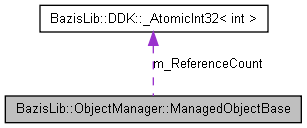BazisLib::ObjectManager::ManagedObjectBase Class Reference
Represents a managed object. More...
#include <objmgr.h>
Inherited by BazisLib::ObjectManager::ServiceObject.

Classes | |
| struct | DebugObjectReference |
| Represents a single managed object for debugging purposes. More... | |
Public Types | |
| enum | { HEAP_ALLOCATION_SIGNATURE = 'JBOM' } |
Public Member Functions | |
| unsigned | Retain () |
| Increments the reference counter. | |
| unsigned | Release () |
| Decrements the reference counter. | |
| unsigned | GetReferenceCount () |
| Returns the reference counter. | |
| virtual ActionStatus | ExecuteSystemCommand (SystemCommand CommandCode, bool Recursive, void *pParam1=NULL, void *pParam2=NULL, void *pParam3=NULL) |
| System command handler. | |
| virtual ActionStatus | ExecuteCommand (class ServiceObject *Caller, unsigned CommandCode, void *pParam1=NULL, void *pParam2=NULL, void *pParam3=NULL) |
| Service-to-client command handler. | |
| void * | operator new (unsigned Size) |
| Debug heap allocation operator. | |
Protected Types | |
| enum | SystemCommand { InvalidCommand, FindCircularReferences, DumpChildren } |
| Defines a system command used in ExecuteSystemCommand() method. More... | |
Private Member Functions | |
| ManagedObjectBase () | |
| Creates a managed object. | |
| virtual | ~ManagedObjectBase () |
| Deletes a managed object. | |
Private Attributes | |
| AtomicInt32 | m_ReferenceCount |
Friends | |
| class | ServiceObject |
Detailed Description
Represents a managed object.This class represents a managed object. Any class that supports reference counting should be a descendant of this class. For details on managed objects, see this article.
Member Enumeration Documentation
enum BazisLib::ObjectManager::ManagedObjectBase::SystemCommand [protected] |
Defines a system command used in ExecuteSystemCommand() method.
Constructor & Destructor Documentation
| BazisLib::ObjectManager::ManagedObjectBase::ManagedObjectBase | ( | ) | [inline, private] |
Creates a managed object.
The default constructor creates the managed object and sets its reference counter to 1. It means that a single ManagedObjectBase::Release() call is required to delete it immediately after creation.
- Remarks:
- In the debug build of the framework, the ManagedObjectBase::ManagedObjectBase() constructor checks whether the object is allocated from heap. This is done with the help of the overloaded ManagedObjectBase::operator new().
| virtual BazisLib::ObjectManager::ManagedObjectBase::~ManagedObjectBase | ( | ) | [inline, private, virtual] |
Deletes a managed object.
This destructor deletes a managed object. Note that managed objects should only be freed by calling the ManagedObject::Release() method. Direct call of the delete operator is not allowed. The debug build of the framework checks this.
Member Function Documentation
| virtual ActionStatus BazisLib::ObjectManager::ManagedObjectBase::ExecuteCommand | ( | class ServiceObject * | Caller, | |
| unsigned | CommandCode, | |||
| void * | pParam1 = NULL, |
|||
| void * | pParam2 = NULL, |
|||
| void * | pParam3 = NULL | |||
| ) | [inline, virtual] |
Service-to-client command handler.
This method is an overrideable handler for user service-to-client commands. You should use the ServiceObject::CallClients() method to send a command to the clients of a service. Further details on service-to-client commands can be found here.
| virtual ActionStatus BazisLib::ObjectManager::ManagedObjectBase::ExecuteSystemCommand | ( | SystemCommand | CommandCode, | |
| bool | Recursive, | |||
| void * | pParam1 = NULL, |
|||
| void * | pParam2 = NULL, |
|||
| void * | pParam3 = NULL | |||
| ) | [inline, virtual] |
System command handler.
This method is an overrideable handler for system service-to-client commands. Such commands differ from user commands (handled by ManagedObjectBase::ExecuteCommand) and can even be recursive. Note that you are not allowed to call this method directly, or use any codes except defined by framework. To handle your own commands, override the ManagedObjectBase::ExecuteCommand method. Further details on service-to-client commands can be found here.
- Parameters:
-
CommandCode Specifies the command code to execute. Recursive Specifies whether a service that received a command should forward it to its clients.
- Returns:
- If your object returns an error code, the command will be aborted and no other objects will be notified. See SystemCommand definition for details on various command types.
Reimplemented in BazisLib::ObjectManager::ServiceObject.
| unsigned BazisLib::ObjectManager::ManagedObjectBase::GetReferenceCount | ( | ) | [inline] |
Returns the reference counter.
This method returns the reference counter of a managed object. This can be useful for debugging, however, you should never make any assumptions about the reference counter value.
| void* BazisLib::ObjectManager::ManagedObjectBase::operator new | ( | unsigned | Size | ) | [inline] |
Debug heap allocation operator.
This operator allocates memory for all managed objects when the framwork is built in the debug mode. It initializes the memory with a special pattern: HEAP_ALLOCATION_SIGNATURE, that, in turn, allows constructors to distinguish between heap-allocated objects and static or stack-allocated ones. It also allows to determine whether a reference (or a managed pointer) is a part (field) of a managed object.
| unsigned BazisLib::ObjectManager::ManagedObjectBase::Release | ( | ) | [inline] |
Decrements the reference counter.
This method decrements the reference counter of a managed object. When reference counter reaches zero, the object is deleted. It is recommended to use the ManagedPointer class instead of calling Retain()/Release() directly.
| unsigned BazisLib::ObjectManager::ManagedObjectBase::Retain | ( | ) | [inline] |
Increments the reference counter.
This method increments the reference counter of a managed object. It is recommended to use the ManagedPointer class instead of calling Retain()/Release() directly.
Friends And Related Function Documentation
friend class ServiceObject [friend] |
Member Data Documentation
The documentation for this class was generated from the following file:
- bzscmn/objmgr.h